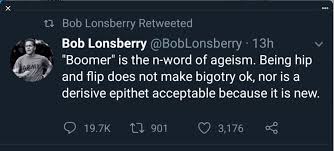Editorial: Is saying “OK, Boomer” offensive?
Recently, a radio talk show host from Seattle, WA, Bob Lonsberry, made a political statement comparing, or bridging the phrase “OK, Boomer” to a racial slur. Further, he claimed it was also an ageist slur.
Ok, Boomers, let’s talk. Do you seriously think this is the same?
We need to remember where the term “Boomer” comes from. There’s no comparison to racial slurs!
The term came after World War II ended and our great nation started to repopulate faster. To be exact, in the year 1946, 3.4 million babies were born. So, imagine the time frame of 1946 to 1964 (Harry S. Truman to Lyndon B. Johnson). In 1950, the Korean War sparked the United States’ desire to preserve democracy around the world. In 1964, the Baby Boomer generation ended due to the Vietnam War.
Between 1946 and 1960, however, the country’s gross national product shot up from $200 billion to $500 billion. Much of this spending came from increased government spending on highways, schools and federal programs. The Baby Boomers were pretty pampered by modern standards, especially straight, white males like Lonsberry.
Let’s look at the college life of Baby Boomers. This time period afforded students the opportunity to pay for college without the stress and anxiety of loans piling up. During this time of economic growth, African Americans protested for equality and the implementation of integration in schools.
African Americans were forced into a separate, but equal system due to the ruling of Plessy vs. Ferguson (1896), until Brown vs. Board of Education (1954) overturned said statement, ruling it unconstitutional. The protests for equal rights kept going after that ruling and led to the Civil Rights Act of 1964.
Did they have to use “Snowflake” as a derogatory term to describe us? Maybe, but thanks to this self-acclaimed conservative radio host, it should not matter what you identify as on the political spectrum. Honestly, this could be a whole different editorial on political parties, but you should be able to make an educated decision on what you believe in based on the candidates’ history and what they believe in. This is essentially another event where it could have been used strategically to influence the upcoming primary and 2020 presidential election.
Overall, we can see that the Baby Boomers should not have a problem with their classification of the time they were born. In contrast, some Baby Boomers do not like the word “Boomer” alone. This is where Lonsberry utterly radicalized the phrase in comparing it to a racist slur. Was he trying to make the political atmosphere more charged by bringing in African American people born in the Baby Boom to look down on Gen X, Millenials and Gen Z by calling them “Snowflakes” or even using their generation names as derogatory terms? Or is he just living proof that some people don’t get it?




